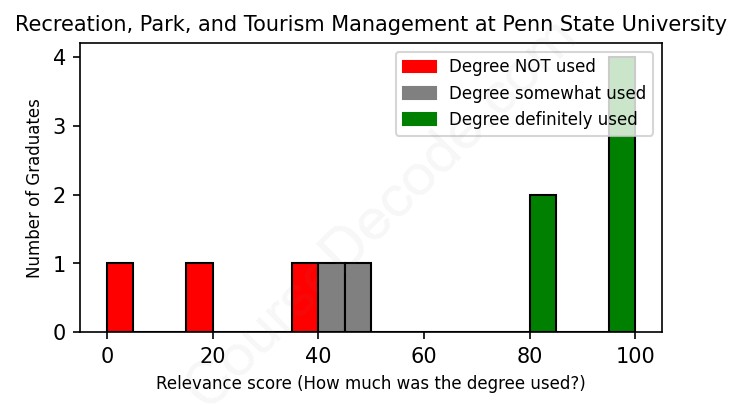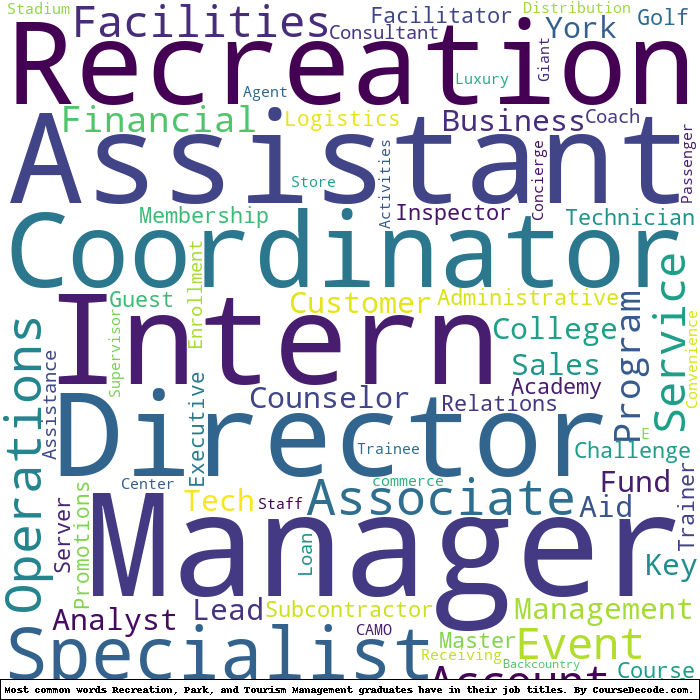
First, some facts. Of the Recreation, Park, and Tourism Management graduates from Penn State University we've analyzed , here's how many have used (or NOT used) their degree in their career:

These are estimates based on AI analysis of 11 LinkedIn profiles (see below).
The verdict? Below average. Overall, with an average relevance score of 60%, Recreation, Park, and Tourism Management graduates from Penn State University have a lower likelihood (-7%) of finding work in this field compared to the average graduate across all fields:
And for comparison, here's the chart for all profiles we've looked at across all degrees.
Also, after graduating, only 10% of these graduates have pursued further education other than another Bachelor's degree (such as a Masters degree or other), compared to the average across all profiles of 35%. This suggests a Bachelors degree is enough for most Recreation, Park, and Tourism Management graduates, and it's normal to look for work straight after graduation.
See the details:
|
Relevance score: 95% We think this person has gone into a career highly relevant to their degree. We think this person has gone into a career highly relevant to their degree.
DEGREE INFOGraduated in 2017 from Penn State University with a Bachelors Degree in Recreation, Park and Tourism Management. Also pursued further education since (see below). JOB HISTORY SINCE GRADUATIONEvent Management Intern Bryce Jordan Center Jan 2017 - May 2017 Graduate Assistant of Aquatics  Virginia Commonwealth University Aug 2017 - May 2019 Aquatic Facilities Coordinator  Florida Gulf Coast University Jun 2019 - Present FURTHER DEGREES DONE SINCE GRADUATINGMaster of Education - MEdVirginia Commonwealth University 2017 - 2019 ABOUTAs the Aquatic Facilities Coordinator at Florida Gulf Coast University, I inspire people to find their passion and cultivate success in their passion. I look to develop relationships with dignity, integrity and grace while leading with a positive attitude. I am especially excited to work through the power of sports and recreation, especially in the world of aquatics. I see the power of sports to develop individual skill while connecting a diverse group of people. By bringing a common purpose across many different peoples lives, recreation and sport professionals can repair communities, shape the future and define legacies. I know that my passion, enthusiasm, and commitment to excellence of inclusion will launch myself into a career of giving back through sport and recreation leadership. Let's connect and be inspired! You can reach me at [EMAIL REMOVED]. |
The top 10 most common jobs done by the graduates we've analyzed (ranked most common to least) are:
After looking through these LinkedIn profiles of people who studied Recreation, Park, and Tourism Management at Penn State University, it's pretty clear that many of them ended up in jobs that aren't exactly related to their degrees. A lot of graduates went into roles like customer service, sales, logistics, and other business-related positions, which don't really tap into the specialized knowledge they gained about managing parks, recreation facilities, or tourism programs. For instance, jobs like Sales Associate or Logistics Account Executive clearly stray pretty far from the intended path of recreation and tourism management.
However, some did manage to find positions that align more closely with their education. Internships and roles that involve event coordination, facility management, or recreation programming—like being a Recreation Intern or working as a Program Coordinator—show a much better fit. Still, it seems that these relevant positions are mixed in with a lot of unrelated jobs, suggesting that while some graduates found their way back to the field they studied, many others wound up in industries that didn’t require their specific training. Overall, it's a mixed bag, with a decent number of folks employing their degree in practical ways, but a big chunk of others finding themselves in roles that don't quite connect to the spirit of Recreation, Park, and Tourism Management. It's definitely a reminder that sometimes, even if you pursue something you love, the job market can lead you in unexpected directions.
Here is a visual representation of the most common words in job titles for Recreation, Park, and Tourism Management graduates (this is across all Recreation, Park, and Tourism Management graduates we've analyzed, not just those who went to Penn State University):

Looking at the career trajectories of graduates from Penn State University who studied Recreation, Park, and Tourism Management, it seems like they've taken a diverse path after graduation, with a mix of roles that relate to their field and others that veer off in different directions. For many, the first jobs after graduation often include internships or entry-level positions in event coordination, customer service, or management roles in recreation and hospitality settings. Over the first few years, some continue to build their careers in similar fields, often moving into more specialized roles or higher management positions. For example, there are graduates who initially worked as recreation interns or event staff, and later ended up in managerial positions at various leisure and tourism organizations.
However, it's worth noting that not all the career paths taken align closely with what you might think of as traditional roles in recreation or tourism. Some alumni have landed jobs in financial aid, sales, or even logistics, which seem a bit removed from their degree. By the five to ten-year mark, many of these graduates have transitioned to roles in facilities management, program coordination, and higher levels of management within recreation-related organizations. While some have certainly found rewarding careers directly related to their studies, others have diversified their skills and adapted to the job market in ways that may not be directly tied to Recreation, Park, and Tourism Management. So, it’s a mixed bag—you’ll find success stories, but also a fair share of folks who have taken a broader approach to their careers after Penn State.
Honestly, a Bachelor’s degree in Recreation, Park, and Tourism Management, like the one at Penn State, tends to be on the easier side compared to some other programs. It’s more about hands-on experiences, working on projects, and interacting with people, which makes it engaging and less focused on hardcore, super tough classes. You’ll definitely have to keep up with some coursework and maybe tackle a few challenging projects, but overall, it’s pretty manageable, especially if you enjoy outdoor activities and planning events. So if you're looking for something that's enjoyable and not crazy difficult, this could be a great fit!
Most commonly, in the LinkedIn profiles we've looked at, it takes people 4 years to finish a Bachelor degree in Recreation, Park, and Tourism Management.
Looking at the job paths of these Penn State graduates, it seems like they’ve had a mixed bag when it comes to making decent money. The ones who climbed the ladder into managerial or specialized roles, like the Associate Business Tech Analyst or those in recreation management at Marriott, probably pulled in a decent salary, especially after a few years on the job. However, some folks, particularly those in roles like customer service or various coordinator positions early on, may not have reached that higher income potential right out of school. Overall, while some individuals appear to be in solid positions now, others might still be finding their footing in terms of salary. It kind of shows that while a degree can open doors, your specific path and the roles you take can really impact your earnings.
Here is a visual representation of the most common words seen in the "about" section of LinkedIn profiles who have a Bachelor degree in Recreation, Park, and Tourism Management (this is across all Recreation, Park, and Tourism Management graduates we've analyzed, not just those who went to Penn State University). This may or may not be useful:

Here are all colleges offering a Bachelor degree in Recreation, Park, and Tourism Management (ordered by the average relevance score of their Recreation, Park, and Tourism Management graduates, best to worst) where we have analyzed at least 10 of their graduates:
| College | Score | Count |
|---|---|---|
 Penn State University Penn State University
|
60 | 11 |